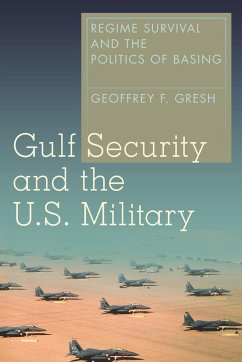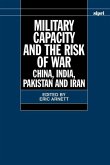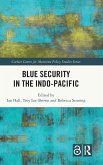- Gebundenes Buch
- Merkliste
- Auf die Merkliste
- Bewerten Bewerten
- Teilen
- Produkt teilen
- Produkterinnerung
- Produkterinnerung
Geoffrey F. Gresh is an Associate Professor at the National Defense University in Washington, D.C.
Andere Kunden interessierten sich auch für
![Historical Dictionary of the Persian Gulf War 1990-1991 Historical Dictionary of the Persian Gulf War 1990-1991]() Clayton R NewellHistorical Dictionary of the Persian Gulf War 1990-1991158,99 €
Clayton R NewellHistorical Dictionary of the Persian Gulf War 1990-1991158,99 €![Military Capacity and the Risk of Wa Military Capacity and the Risk of Wa]() Eric Arnett (ed.)Military Capacity and the Risk of Wa262,99 €
Eric Arnett (ed.)Military Capacity and the Risk of Wa262,99 €![Blue Security in the Indo-Pacific Blue Security in the Indo-Pacific]() Blue Security in the Indo-Pacific197,99 €
Blue Security in the Indo-Pacific197,99 €![The Future of Land Warfare The Future of Land Warfare]() Michael E O'HanlonThe Future of Land Warfare42,99 €
Michael E O'HanlonThe Future of Land Warfare42,99 €![The Strategy Bridge The Strategy Bridge]() Colin S GrayThe Strategy Bridge166,99 €
Colin S GrayThe Strategy Bridge166,99 €![Space Warfare in the 21st Century Space Warfare in the 21st Century]() Joan Johnson-FreeseSpace Warfare in the 21st Century174,99 €
Joan Johnson-FreeseSpace Warfare in the 21st Century174,99 €![The Absence of Grand Strategy The Absence of Grand Strategy]() Steve A YetivThe Absence of Grand Strategy71,99 €
Steve A YetivThe Absence of Grand Strategy71,99 €-
-
-
Geoffrey F. Gresh is an Associate Professor at the National Defense University in Washington, D.C.
Hinweis: Dieser Artikel kann nur an eine deutsche Lieferadresse ausgeliefert werden.
Hinweis: Dieser Artikel kann nur an eine deutsche Lieferadresse ausgeliefert werden.
Produktdetails
- Produktdetails
- Verlag: Stanford University Press
- Seitenzahl: 280
- Erscheinungstermin: 10. Juni 2015
- Englisch
- Abmessung: 236mm x 154mm x 22mm
- Gewicht: 506g
- ISBN-13: 9780804794206
- ISBN-10: 0804794200
- Artikelnr.: 41752497
- Herstellerkennzeichnung
- Libri GmbH
- Europaallee 1
- 36244 Bad Hersfeld
- gpsr@libri.de
- Verlag: Stanford University Press
- Seitenzahl: 280
- Erscheinungstermin: 10. Juni 2015
- Englisch
- Abmessung: 236mm x 154mm x 22mm
- Gewicht: 506g
- ISBN-13: 9780804794206
- ISBN-10: 0804794200
- Artikelnr.: 41752497
- Herstellerkennzeichnung
- Libri GmbH
- Europaallee 1
- 36244 Bad Hersfeld
- gpsr@libri.de
Geoffrey F. Gresh is an Associate Professor at the National Defense University in Washington, D.C.
Contents and Abstracts
Introduction: Gulf national security and the politics of Basing
chapter abstract
This chapter provides a theoretical and strategic overview of the U.S.
military basing presence in the Gulf from the Second World War to the
present. It lays a framework for examining the history of the U.S. military
in the Gulf by placing the book within the larger base politics literature,
in addition to providing a broad overview on the global evolution of U.S.
military basing following the Second World War. Base politics and basing
access for military forces is one of the oldest enduring features of
international relations among nations and empires. The central question
posed here is when and why did base politicization occur in Gulf Arab host
nations. External and internal security dynamics linked to a host regime's
survival are the main drivers influencing Gulf Cooperation Council nations
either to accept or expel the U.S. military from local bases.
1Oil and War
chapter abstract
This chapter sets the stage for how the United States came to establish its
first military base in the region, while placing the Gulf in its larger
strategic and global context. As the United States became more entangled in
the Second World War, the U.S. military grew adamant about securing base
installations to support its war efforts. Additionally, the U.S. military
needed easy access to the valuable oil resources of the Gulf to buoy its
operations abroad. Political pressure from U.S. oil companies operating in
the Gulf also helped convince the U.S. government to pursue a more active
regional strategy to safeguard significant U.S. investments and other
regional assets. The first establishment of a base at Dhahran would be
crucial at the end of the war to assist with postwar construction efforts
in Europe and Pacific Asia.
2Negotiating a Foothold
chapter abstract
This chapter explores the origins of the U.S. military's complex
relationship with the Gulf Arab monarchies, especially with the Saud royal
family, following the Second World War. A more permanent U.S. military
basing presence was never an inevitable conclusion and depended upon a
combination of shifting national security dynamics and U.S. military and
economic aid packages. This chapter examines the key domestic opposition
groups influenced by pan-Arab nationalism that threatened the monarchy
versus external security factors, including threats emanating from the
Hashemite Kingdom and a rising Soviet Union. Though pan-Arab nationalism
played a certain role in stimulating domestic instability in Saudi Arabia,
three separate regional factors played a more influential role in
determining the Saud monarchy's decision to permit the continued U.S.
military basing presence: Hashemite threats to invade the kingdom, the
ongoing Buraimi Oasis crisis between Great Britain and the Trucial
Shaykhdoms, and the Suez Canal crisis.
3Regime Survival and the U.S. Military
chapter abstract
This chapter examines the events that led to the eventual basing
termination and expulsion of the U.S. military from its Saudi bases in
1962. With fewer external security concerns by the early 1960s, the Saud
monarchy turned its attention to domestic politics and rising concerns
regarding Egyptian President Gamal Abdel Nasser's influence over pan-Arab
national groups in the kingdom. By the end of the 1950s and early 1960s,
domestic security concerns grew to a new high as the U.S. military's
presence exacerbated attacks on the legitimacy of a monarchy under mounting
domestic pressure. Opposition groups portrayed the United States as an
imperial occupying force, helping erode the power and damage the image of
the monarchy domestically. The Saud monarchy appeared concerned about its
survival and its association with the U.S. military and terminated its
long-term basing contract in the spring of 1962.
4A Light Footprint in Bahrain
chapter abstract
After declaring independence in 1971, Bahrain signed a basing agreement
with the United States, prompted by external security fears associated with
Iran's desire to annex the tiny island nation. But when the Yom Kippur War
broke out in 1973 with the U.S. supporting Israel in the war, Bahrainis
violently voiced their outrage over the U.S. naval presence. In late 1973,
the Bahraini government announced that the U.S. naval basing agreement
would be terminated. The U.S. lost its homeport at Jufair, but it was able
to negotiate the maintenance of a light footprint including the presence of
an administrative support unit for U.S. naval regional logistics. This
chapter examines both the domestic security challenges faced by the
Khalifas during this period and the politics involved in the homeport
expulsion.
5Sultan Qaboos and Operation Eagle Claw
chapter abstract
This chapter examines Oman's relations with the U.S. military after the
1979 U.S. expulsion from Iran. Oman acts as a valuable historical case
study that illuminates important lessons learned about what can work when
negotiating for basing access with a host nation under heightened domestic
pressure. Oman's Sultan Qaboos had long faced internal opposition that
stemmed from the Dhofar rebellion of the 1960s and early 1970s. His fears
were exacerbated when it became known that, unbeknownst to Sultan Qaboos,
President Carter had violated Omani sovereignty in executing a secret
rescue mission, codenamed Eagle Claw, to free U.S. hostages held captive by
Iranian revolutionaries in Tehran at the U.S. Embassy. After lengthy
negotiations and the subsequent increase in U.S. military and economic aid
incentives, including promises of a less visible and low-profile military,
the U.S. was able to maintain its military basing access in Oman.
6A Saudi Sandstorm: Rivalry, Revolution, and terrorism
chapter abstract
This chapter studies the process that led to the Saudi decision to
reestablish a U.S. military basing presence in 1990. Though Saudi Arabia
maintained its partnership with the U.S. military throughout the 1970s and
1980s, the U.S. was not given control of local bases after 1962 until the
First Gulf War. The external threat posed by Iraq was the main driver
behind convincing the Saud monarchy to allow a U.S. military basing
presence. From 1990 to 2003, the kingdom confronted major domestic security
challenges, including several terrorist attacks motivated by the U.S.
military basing presence, but it was not until Saddam Hussein was finally
removed in 2003 that the U.S. military was asked to terminate its basing
presence. Iran also posed less of a threat to the kingdom since U.S.
military bases surrounded Iran on both its eastern and western borders,
including in Kuwait, Qatar, Bahrain, Afghanistan, and Kyrgyzstan.
Conclusion: The GCC Today and Lessons learned for the U.S. Military
chapter abstract
The conclusion assesses the current and future U.S. military Gulf presence
following its Saudi departure, as well as the present challenges ushered in
by regional violence since 2011. The U.S. military maintains a significant
presence across the Arabian Peninsula but it must now confront a new and
emerging dynamic where most GCC countries have begun to diversify their
political, military, economic, technological, and security partnerships
with countries other than the United States. Many GCC nations have turned
in recent years to the East to emerging powers such as China, Russia, and
India to assist with their national security and economic needs.
Nonetheless, understanding the dynamics of base politicization in a host
nation remains important today and studying base politics more broadly
helps explain when and why basing access may go awry for future
policymakers and scholars of the region.
Introduction: Gulf national security and the politics of Basing
chapter abstract
This chapter provides a theoretical and strategic overview of the U.S.
military basing presence in the Gulf from the Second World War to the
present. It lays a framework for examining the history of the U.S. military
in the Gulf by placing the book within the larger base politics literature,
in addition to providing a broad overview on the global evolution of U.S.
military basing following the Second World War. Base politics and basing
access for military forces is one of the oldest enduring features of
international relations among nations and empires. The central question
posed here is when and why did base politicization occur in Gulf Arab host
nations. External and internal security dynamics linked to a host regime's
survival are the main drivers influencing Gulf Cooperation Council nations
either to accept or expel the U.S. military from local bases.
1Oil and War
chapter abstract
This chapter sets the stage for how the United States came to establish its
first military base in the region, while placing the Gulf in its larger
strategic and global context. As the United States became more entangled in
the Second World War, the U.S. military grew adamant about securing base
installations to support its war efforts. Additionally, the U.S. military
needed easy access to the valuable oil resources of the Gulf to buoy its
operations abroad. Political pressure from U.S. oil companies operating in
the Gulf also helped convince the U.S. government to pursue a more active
regional strategy to safeguard significant U.S. investments and other
regional assets. The first establishment of a base at Dhahran would be
crucial at the end of the war to assist with postwar construction efforts
in Europe and Pacific Asia.
2Negotiating a Foothold
chapter abstract
This chapter explores the origins of the U.S. military's complex
relationship with the Gulf Arab monarchies, especially with the Saud royal
family, following the Second World War. A more permanent U.S. military
basing presence was never an inevitable conclusion and depended upon a
combination of shifting national security dynamics and U.S. military and
economic aid packages. This chapter examines the key domestic opposition
groups influenced by pan-Arab nationalism that threatened the monarchy
versus external security factors, including threats emanating from the
Hashemite Kingdom and a rising Soviet Union. Though pan-Arab nationalism
played a certain role in stimulating domestic instability in Saudi Arabia,
three separate regional factors played a more influential role in
determining the Saud monarchy's decision to permit the continued U.S.
military basing presence: Hashemite threats to invade the kingdom, the
ongoing Buraimi Oasis crisis between Great Britain and the Trucial
Shaykhdoms, and the Suez Canal crisis.
3Regime Survival and the U.S. Military
chapter abstract
This chapter examines the events that led to the eventual basing
termination and expulsion of the U.S. military from its Saudi bases in
1962. With fewer external security concerns by the early 1960s, the Saud
monarchy turned its attention to domestic politics and rising concerns
regarding Egyptian President Gamal Abdel Nasser's influence over pan-Arab
national groups in the kingdom. By the end of the 1950s and early 1960s,
domestic security concerns grew to a new high as the U.S. military's
presence exacerbated attacks on the legitimacy of a monarchy under mounting
domestic pressure. Opposition groups portrayed the United States as an
imperial occupying force, helping erode the power and damage the image of
the monarchy domestically. The Saud monarchy appeared concerned about its
survival and its association with the U.S. military and terminated its
long-term basing contract in the spring of 1962.
4A Light Footprint in Bahrain
chapter abstract
After declaring independence in 1971, Bahrain signed a basing agreement
with the United States, prompted by external security fears associated with
Iran's desire to annex the tiny island nation. But when the Yom Kippur War
broke out in 1973 with the U.S. supporting Israel in the war, Bahrainis
violently voiced their outrage over the U.S. naval presence. In late 1973,
the Bahraini government announced that the U.S. naval basing agreement
would be terminated. The U.S. lost its homeport at Jufair, but it was able
to negotiate the maintenance of a light footprint including the presence of
an administrative support unit for U.S. naval regional logistics. This
chapter examines both the domestic security challenges faced by the
Khalifas during this period and the politics involved in the homeport
expulsion.
5Sultan Qaboos and Operation Eagle Claw
chapter abstract
This chapter examines Oman's relations with the U.S. military after the
1979 U.S. expulsion from Iran. Oman acts as a valuable historical case
study that illuminates important lessons learned about what can work when
negotiating for basing access with a host nation under heightened domestic
pressure. Oman's Sultan Qaboos had long faced internal opposition that
stemmed from the Dhofar rebellion of the 1960s and early 1970s. His fears
were exacerbated when it became known that, unbeknownst to Sultan Qaboos,
President Carter had violated Omani sovereignty in executing a secret
rescue mission, codenamed Eagle Claw, to free U.S. hostages held captive by
Iranian revolutionaries in Tehran at the U.S. Embassy. After lengthy
negotiations and the subsequent increase in U.S. military and economic aid
incentives, including promises of a less visible and low-profile military,
the U.S. was able to maintain its military basing access in Oman.
6A Saudi Sandstorm: Rivalry, Revolution, and terrorism
chapter abstract
This chapter studies the process that led to the Saudi decision to
reestablish a U.S. military basing presence in 1990. Though Saudi Arabia
maintained its partnership with the U.S. military throughout the 1970s and
1980s, the U.S. was not given control of local bases after 1962 until the
First Gulf War. The external threat posed by Iraq was the main driver
behind convincing the Saud monarchy to allow a U.S. military basing
presence. From 1990 to 2003, the kingdom confronted major domestic security
challenges, including several terrorist attacks motivated by the U.S.
military basing presence, but it was not until Saddam Hussein was finally
removed in 2003 that the U.S. military was asked to terminate its basing
presence. Iran also posed less of a threat to the kingdom since U.S.
military bases surrounded Iran on both its eastern and western borders,
including in Kuwait, Qatar, Bahrain, Afghanistan, and Kyrgyzstan.
Conclusion: The GCC Today and Lessons learned for the U.S. Military
chapter abstract
The conclusion assesses the current and future U.S. military Gulf presence
following its Saudi departure, as well as the present challenges ushered in
by regional violence since 2011. The U.S. military maintains a significant
presence across the Arabian Peninsula but it must now confront a new and
emerging dynamic where most GCC countries have begun to diversify their
political, military, economic, technological, and security partnerships
with countries other than the United States. Many GCC nations have turned
in recent years to the East to emerging powers such as China, Russia, and
India to assist with their national security and economic needs.
Nonetheless, understanding the dynamics of base politicization in a host
nation remains important today and studying base politics more broadly
helps explain when and why basing access may go awry for future
policymakers and scholars of the region.
Contents and Abstracts
Introduction: Gulf national security and the politics of Basing
chapter abstract
This chapter provides a theoretical and strategic overview of the U.S.
military basing presence in the Gulf from the Second World War to the
present. It lays a framework for examining the history of the U.S. military
in the Gulf by placing the book within the larger base politics literature,
in addition to providing a broad overview on the global evolution of U.S.
military basing following the Second World War. Base politics and basing
access for military forces is one of the oldest enduring features of
international relations among nations and empires. The central question
posed here is when and why did base politicization occur in Gulf Arab host
nations. External and internal security dynamics linked to a host regime's
survival are the main drivers influencing Gulf Cooperation Council nations
either to accept or expel the U.S. military from local bases.
1Oil and War
chapter abstract
This chapter sets the stage for how the United States came to establish its
first military base in the region, while placing the Gulf in its larger
strategic and global context. As the United States became more entangled in
the Second World War, the U.S. military grew adamant about securing base
installations to support its war efforts. Additionally, the U.S. military
needed easy access to the valuable oil resources of the Gulf to buoy its
operations abroad. Political pressure from U.S. oil companies operating in
the Gulf also helped convince the U.S. government to pursue a more active
regional strategy to safeguard significant U.S. investments and other
regional assets. The first establishment of a base at Dhahran would be
crucial at the end of the war to assist with postwar construction efforts
in Europe and Pacific Asia.
2Negotiating a Foothold
chapter abstract
This chapter explores the origins of the U.S. military's complex
relationship with the Gulf Arab monarchies, especially with the Saud royal
family, following the Second World War. A more permanent U.S. military
basing presence was never an inevitable conclusion and depended upon a
combination of shifting national security dynamics and U.S. military and
economic aid packages. This chapter examines the key domestic opposition
groups influenced by pan-Arab nationalism that threatened the monarchy
versus external security factors, including threats emanating from the
Hashemite Kingdom and a rising Soviet Union. Though pan-Arab nationalism
played a certain role in stimulating domestic instability in Saudi Arabia,
three separate regional factors played a more influential role in
determining the Saud monarchy's decision to permit the continued U.S.
military basing presence: Hashemite threats to invade the kingdom, the
ongoing Buraimi Oasis crisis between Great Britain and the Trucial
Shaykhdoms, and the Suez Canal crisis.
3Regime Survival and the U.S. Military
chapter abstract
This chapter examines the events that led to the eventual basing
termination and expulsion of the U.S. military from its Saudi bases in
1962. With fewer external security concerns by the early 1960s, the Saud
monarchy turned its attention to domestic politics and rising concerns
regarding Egyptian President Gamal Abdel Nasser's influence over pan-Arab
national groups in the kingdom. By the end of the 1950s and early 1960s,
domestic security concerns grew to a new high as the U.S. military's
presence exacerbated attacks on the legitimacy of a monarchy under mounting
domestic pressure. Opposition groups portrayed the United States as an
imperial occupying force, helping erode the power and damage the image of
the monarchy domestically. The Saud monarchy appeared concerned about its
survival and its association with the U.S. military and terminated its
long-term basing contract in the spring of 1962.
4A Light Footprint in Bahrain
chapter abstract
After declaring independence in 1971, Bahrain signed a basing agreement
with the United States, prompted by external security fears associated with
Iran's desire to annex the tiny island nation. But when the Yom Kippur War
broke out in 1973 with the U.S. supporting Israel in the war, Bahrainis
violently voiced their outrage over the U.S. naval presence. In late 1973,
the Bahraini government announced that the U.S. naval basing agreement
would be terminated. The U.S. lost its homeport at Jufair, but it was able
to negotiate the maintenance of a light footprint including the presence of
an administrative support unit for U.S. naval regional logistics. This
chapter examines both the domestic security challenges faced by the
Khalifas during this period and the politics involved in the homeport
expulsion.
5Sultan Qaboos and Operation Eagle Claw
chapter abstract
This chapter examines Oman's relations with the U.S. military after the
1979 U.S. expulsion from Iran. Oman acts as a valuable historical case
study that illuminates important lessons learned about what can work when
negotiating for basing access with a host nation under heightened domestic
pressure. Oman's Sultan Qaboos had long faced internal opposition that
stemmed from the Dhofar rebellion of the 1960s and early 1970s. His fears
were exacerbated when it became known that, unbeknownst to Sultan Qaboos,
President Carter had violated Omani sovereignty in executing a secret
rescue mission, codenamed Eagle Claw, to free U.S. hostages held captive by
Iranian revolutionaries in Tehran at the U.S. Embassy. After lengthy
negotiations and the subsequent increase in U.S. military and economic aid
incentives, including promises of a less visible and low-profile military,
the U.S. was able to maintain its military basing access in Oman.
6A Saudi Sandstorm: Rivalry, Revolution, and terrorism
chapter abstract
This chapter studies the process that led to the Saudi decision to
reestablish a U.S. military basing presence in 1990. Though Saudi Arabia
maintained its partnership with the U.S. military throughout the 1970s and
1980s, the U.S. was not given control of local bases after 1962 until the
First Gulf War. The external threat posed by Iraq was the main driver
behind convincing the Saud monarchy to allow a U.S. military basing
presence. From 1990 to 2003, the kingdom confronted major domestic security
challenges, including several terrorist attacks motivated by the U.S.
military basing presence, but it was not until Saddam Hussein was finally
removed in 2003 that the U.S. military was asked to terminate its basing
presence. Iran also posed less of a threat to the kingdom since U.S.
military bases surrounded Iran on both its eastern and western borders,
including in Kuwait, Qatar, Bahrain, Afghanistan, and Kyrgyzstan.
Conclusion: The GCC Today and Lessons learned for the U.S. Military
chapter abstract
The conclusion assesses the current and future U.S. military Gulf presence
following its Saudi departure, as well as the present challenges ushered in
by regional violence since 2011. The U.S. military maintains a significant
presence across the Arabian Peninsula but it must now confront a new and
emerging dynamic where most GCC countries have begun to diversify their
political, military, economic, technological, and security partnerships
with countries other than the United States. Many GCC nations have turned
in recent years to the East to emerging powers such as China, Russia, and
India to assist with their national security and economic needs.
Nonetheless, understanding the dynamics of base politicization in a host
nation remains important today and studying base politics more broadly
helps explain when and why basing access may go awry for future
policymakers and scholars of the region.
Introduction: Gulf national security and the politics of Basing
chapter abstract
This chapter provides a theoretical and strategic overview of the U.S.
military basing presence in the Gulf from the Second World War to the
present. It lays a framework for examining the history of the U.S. military
in the Gulf by placing the book within the larger base politics literature,
in addition to providing a broad overview on the global evolution of U.S.
military basing following the Second World War. Base politics and basing
access for military forces is one of the oldest enduring features of
international relations among nations and empires. The central question
posed here is when and why did base politicization occur in Gulf Arab host
nations. External and internal security dynamics linked to a host regime's
survival are the main drivers influencing Gulf Cooperation Council nations
either to accept or expel the U.S. military from local bases.
1Oil and War
chapter abstract
This chapter sets the stage for how the United States came to establish its
first military base in the region, while placing the Gulf in its larger
strategic and global context. As the United States became more entangled in
the Second World War, the U.S. military grew adamant about securing base
installations to support its war efforts. Additionally, the U.S. military
needed easy access to the valuable oil resources of the Gulf to buoy its
operations abroad. Political pressure from U.S. oil companies operating in
the Gulf also helped convince the U.S. government to pursue a more active
regional strategy to safeguard significant U.S. investments and other
regional assets. The first establishment of a base at Dhahran would be
crucial at the end of the war to assist with postwar construction efforts
in Europe and Pacific Asia.
2Negotiating a Foothold
chapter abstract
This chapter explores the origins of the U.S. military's complex
relationship with the Gulf Arab monarchies, especially with the Saud royal
family, following the Second World War. A more permanent U.S. military
basing presence was never an inevitable conclusion and depended upon a
combination of shifting national security dynamics and U.S. military and
economic aid packages. This chapter examines the key domestic opposition
groups influenced by pan-Arab nationalism that threatened the monarchy
versus external security factors, including threats emanating from the
Hashemite Kingdom and a rising Soviet Union. Though pan-Arab nationalism
played a certain role in stimulating domestic instability in Saudi Arabia,
three separate regional factors played a more influential role in
determining the Saud monarchy's decision to permit the continued U.S.
military basing presence: Hashemite threats to invade the kingdom, the
ongoing Buraimi Oasis crisis between Great Britain and the Trucial
Shaykhdoms, and the Suez Canal crisis.
3Regime Survival and the U.S. Military
chapter abstract
This chapter examines the events that led to the eventual basing
termination and expulsion of the U.S. military from its Saudi bases in
1962. With fewer external security concerns by the early 1960s, the Saud
monarchy turned its attention to domestic politics and rising concerns
regarding Egyptian President Gamal Abdel Nasser's influence over pan-Arab
national groups in the kingdom. By the end of the 1950s and early 1960s,
domestic security concerns grew to a new high as the U.S. military's
presence exacerbated attacks on the legitimacy of a monarchy under mounting
domestic pressure. Opposition groups portrayed the United States as an
imperial occupying force, helping erode the power and damage the image of
the monarchy domestically. The Saud monarchy appeared concerned about its
survival and its association with the U.S. military and terminated its
long-term basing contract in the spring of 1962.
4A Light Footprint in Bahrain
chapter abstract
After declaring independence in 1971, Bahrain signed a basing agreement
with the United States, prompted by external security fears associated with
Iran's desire to annex the tiny island nation. But when the Yom Kippur War
broke out in 1973 with the U.S. supporting Israel in the war, Bahrainis
violently voiced their outrage over the U.S. naval presence. In late 1973,
the Bahraini government announced that the U.S. naval basing agreement
would be terminated. The U.S. lost its homeport at Jufair, but it was able
to negotiate the maintenance of a light footprint including the presence of
an administrative support unit for U.S. naval regional logistics. This
chapter examines both the domestic security challenges faced by the
Khalifas during this period and the politics involved in the homeport
expulsion.
5Sultan Qaboos and Operation Eagle Claw
chapter abstract
This chapter examines Oman's relations with the U.S. military after the
1979 U.S. expulsion from Iran. Oman acts as a valuable historical case
study that illuminates important lessons learned about what can work when
negotiating for basing access with a host nation under heightened domestic
pressure. Oman's Sultan Qaboos had long faced internal opposition that
stemmed from the Dhofar rebellion of the 1960s and early 1970s. His fears
were exacerbated when it became known that, unbeknownst to Sultan Qaboos,
President Carter had violated Omani sovereignty in executing a secret
rescue mission, codenamed Eagle Claw, to free U.S. hostages held captive by
Iranian revolutionaries in Tehran at the U.S. Embassy. After lengthy
negotiations and the subsequent increase in U.S. military and economic aid
incentives, including promises of a less visible and low-profile military,
the U.S. was able to maintain its military basing access in Oman.
6A Saudi Sandstorm: Rivalry, Revolution, and terrorism
chapter abstract
This chapter studies the process that led to the Saudi decision to
reestablish a U.S. military basing presence in 1990. Though Saudi Arabia
maintained its partnership with the U.S. military throughout the 1970s and
1980s, the U.S. was not given control of local bases after 1962 until the
First Gulf War. The external threat posed by Iraq was the main driver
behind convincing the Saud monarchy to allow a U.S. military basing
presence. From 1990 to 2003, the kingdom confronted major domestic security
challenges, including several terrorist attacks motivated by the U.S.
military basing presence, but it was not until Saddam Hussein was finally
removed in 2003 that the U.S. military was asked to terminate its basing
presence. Iran also posed less of a threat to the kingdom since U.S.
military bases surrounded Iran on both its eastern and western borders,
including in Kuwait, Qatar, Bahrain, Afghanistan, and Kyrgyzstan.
Conclusion: The GCC Today and Lessons learned for the U.S. Military
chapter abstract
The conclusion assesses the current and future U.S. military Gulf presence
following its Saudi departure, as well as the present challenges ushered in
by regional violence since 2011. The U.S. military maintains a significant
presence across the Arabian Peninsula but it must now confront a new and
emerging dynamic where most GCC countries have begun to diversify their
political, military, economic, technological, and security partnerships
with countries other than the United States. Many GCC nations have turned
in recent years to the East to emerging powers such as China, Russia, and
India to assist with their national security and economic needs.
Nonetheless, understanding the dynamics of base politicization in a host
nation remains important today and studying base politics more broadly
helps explain when and why basing access may go awry for future
policymakers and scholars of the region.








